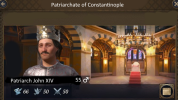The hesychast controversy
The hesychast controversy occurred between Gregory Palamas, arguing for mystic forms of monasticism, and Baarlam of Calabria, arguing for a more realistic, Aristotelian approach. Hesychasm heavily influenced Orthodox Christianity and further separated it from the western church. There should be an event chain relating to it in 1337. Here is how it could look:
-----------------------------------------------------------------------------------------------------------------------------------------------------------------------------------------
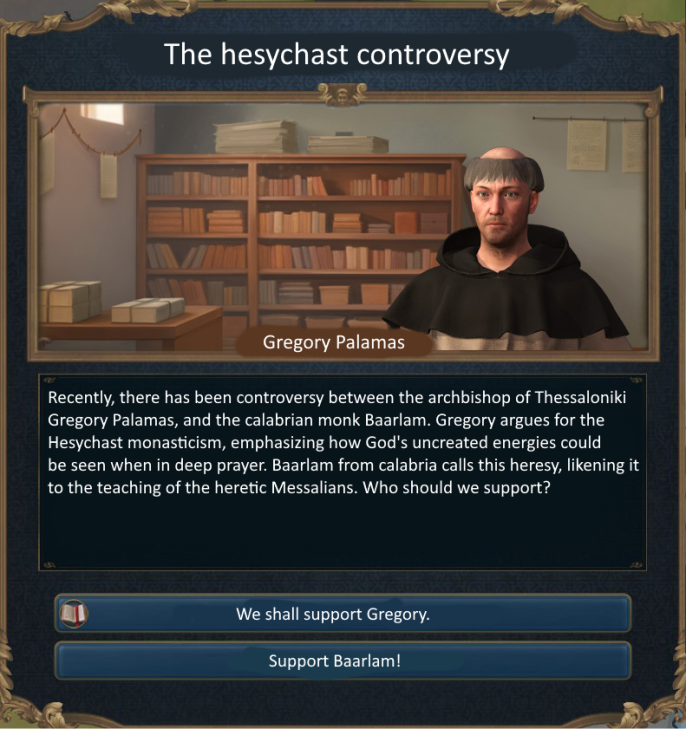
The first event, to spark things off. Here you get two options, support Palamas, or support Baarlam. These choices will influence the next events in the event chain:
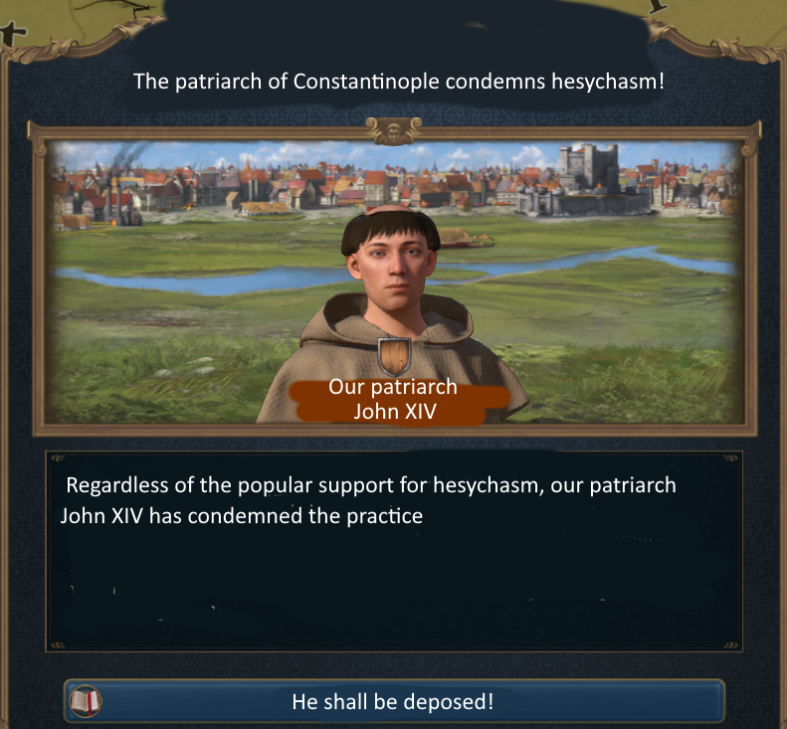
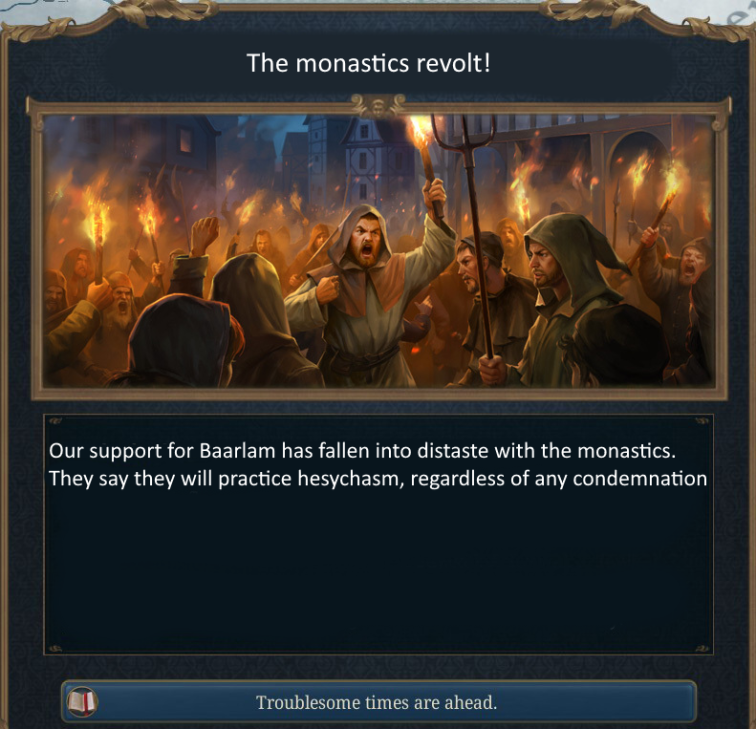
The first option is if you supported Palamas, while the second option is if you supported Baarlam. There is no tooltip explaining what each event does, as that would be a matter of balancing for the devs.
The final event would look something like this:
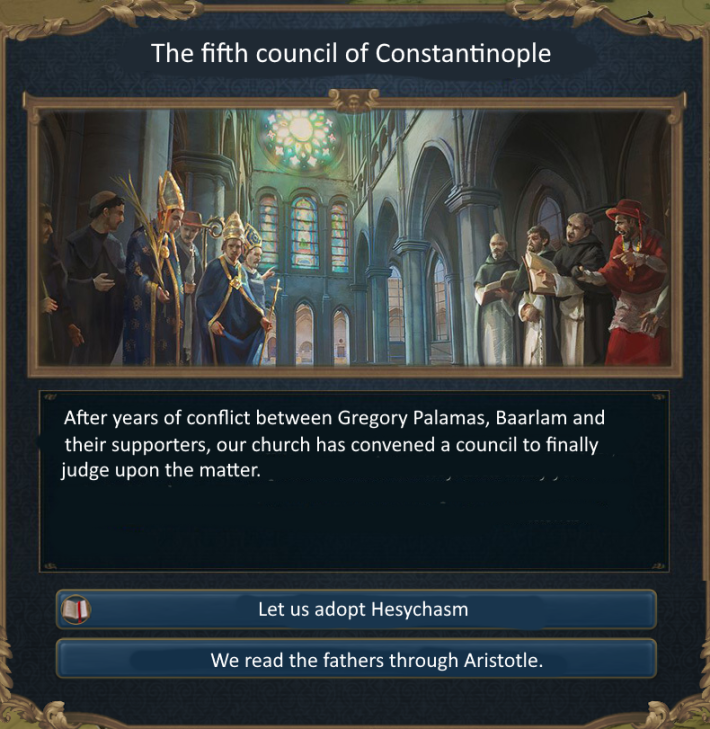
There is a law in the Patriarchate IO concerning this. It looks like this:
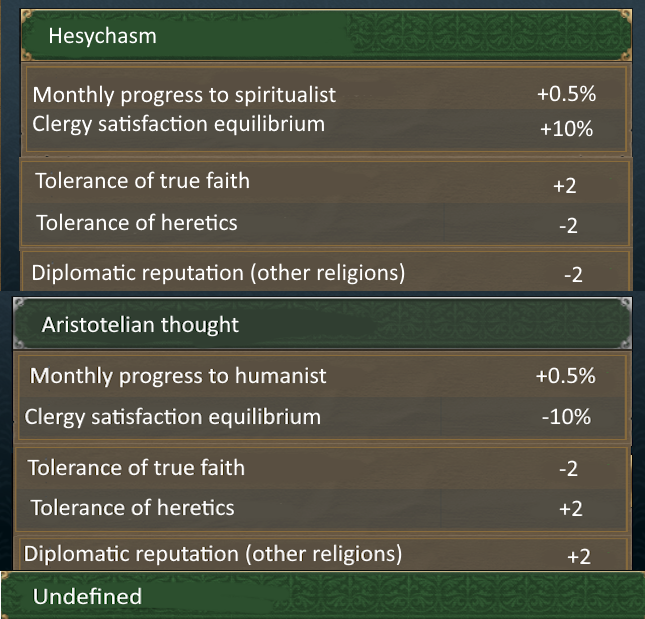
If in the council of Constantinople you chose hesychasm, you would adopt the "Hesychasm" policy, while if you chose the second option you would adopt the "Aristotelian thought" policy.
Hesychasm would further spread by event until all orthodox patriarchates set a law regarding it.
-----------------------------------------------------------------------------------------------------------------------------------------------------------------------------------------
Ecumenical councils
When changing an important policy such as "Christology", you would need to invoke an "Ecumenical Council" International Organization. Here is how it would look:
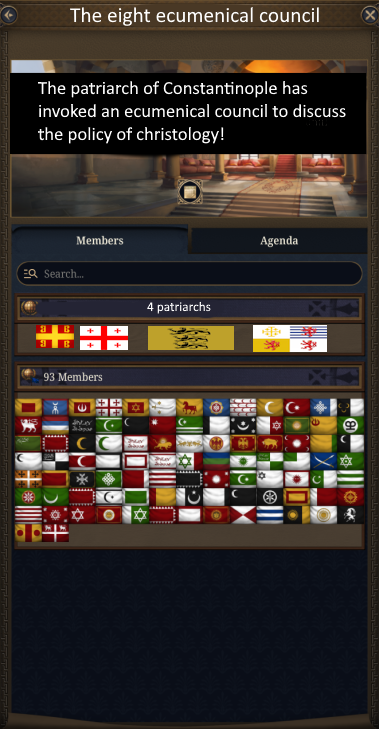
The interface is taken from the Ilkhanate IO, but you get the idea. All orthodox patriarchs, and all orthodox nations would participate, in this case byzantium, georgia, bulgaria and cyprus. The IO would vote similarly to the catholicism IO

When the ecumenical council ends, it would change the law discussed in all orthodox patriarchates.
Ecumenical councils are necessary because it is impossible for any orthodox religious figure to simply "decide" to change an important law without consulting with all bishops. This is what differentiates orthodoxy from catholicism.
----------------------------------------------------------------------------------------------------------------------------------------------------------------
The patriarchate problem
Patriarchates don't always correspond to countries. For example, if Byzantium takes Antioch, Antioch will not be under Constantinople's juridiction, but will still be their own patriarchate. How does paradox intend to adress this?
My solution is to have Antiochene, Roman, Jerusalemite and Alexandrian patriarchates tied to a building, thus being a building based country. similar to a "cardinal seat".
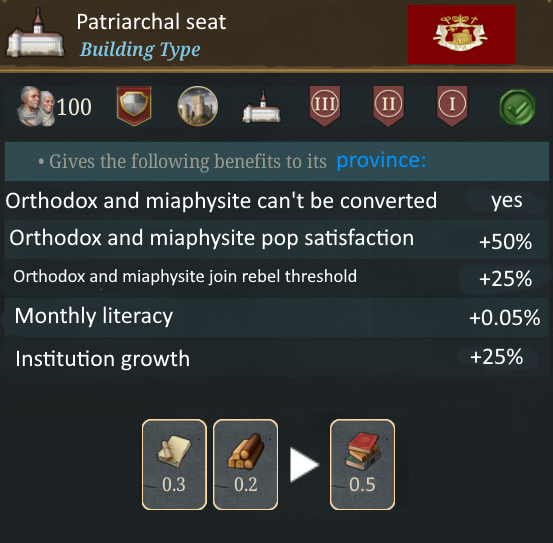
This building automatically creates a "Patriarchate" that rules the province, in this example, this building is owned by the Jerusalem patriarchate, as indicated by the flag in the top right corner. When an orthodox or miaphysite country takes control of a patriarch seat, the building-based country has an event to convert to the religion of its owner, the AI would always convert. This isn't a perfect system, but if Paradox wants to accurately portray how orthodox christian administration works, all the patriarchates mentioned in the ecumenical creeds must keep existing, as dismantling them would be high heresy, and not portraying them would defeat the purpose of portraying patriarchates.
When an orthodox country conquers rome, this building would automatically be built in that location.
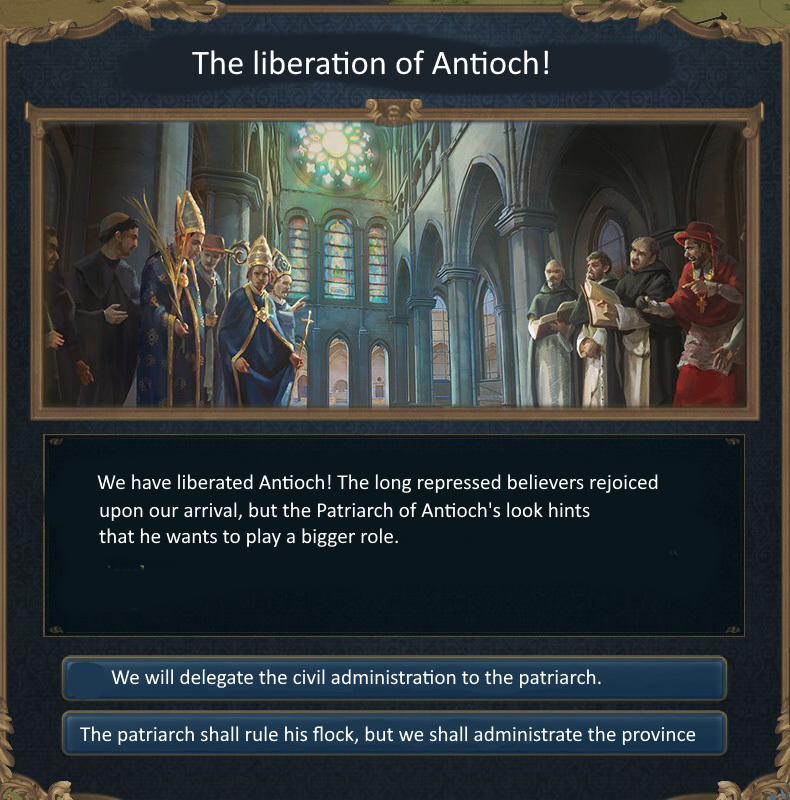
To further enhance this mechanic, every time a patriarchal seat is conquered, you get an event like this. First option gives the building-based country a vassal that actually rules the land, as mentioned possible in the tinto talks. I don't know if you can vassalize building based countries, but if not, the vassal could just become yours and adhere to the patriarchate IO instead.
----------------------------------------------------------------------------------------------------------------------------------------------------------------
Further flavor
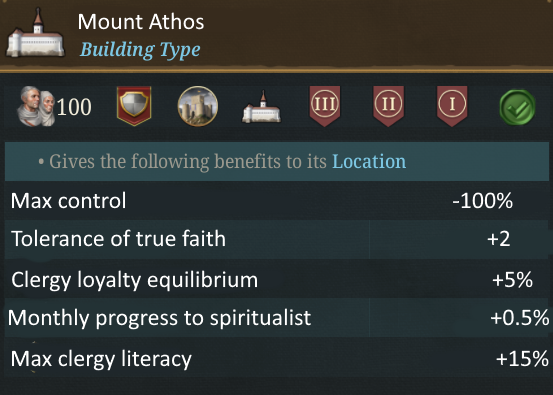
Mount Athos is the center of orthodox christianity. It should have a unique building, like St. Peter's basilica.
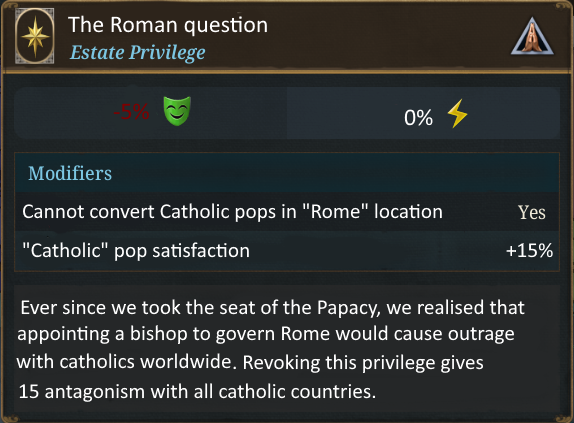
When an orthodox country takes the location of Rome, this privilege is given instantly. This would provide a challenge to convert catholics in Rome.
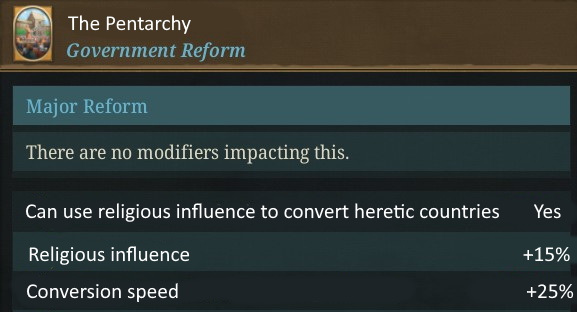
A government reform available to patriarchates after Antioch, Rome, Constantinople, Alexandria and Jerusalem are owned by an orthodox country and majority orthodox locations.
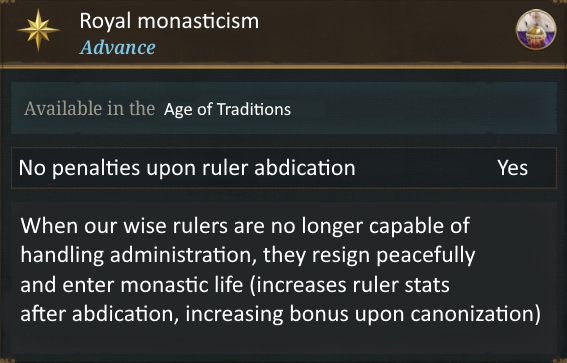
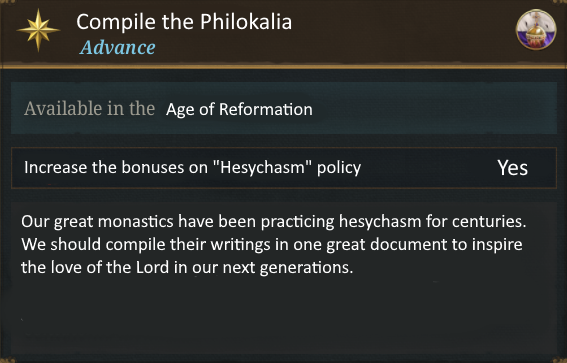
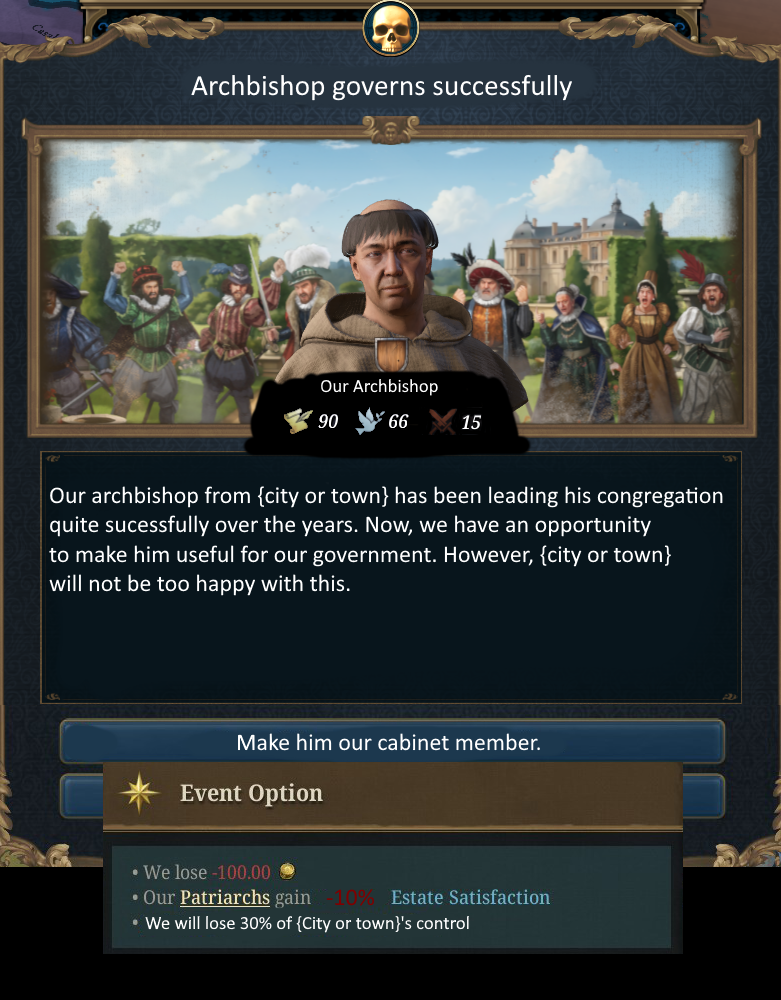
...And other small flavor for christian religion like this
----------------------------------------------------------------------------------------------------------------------------------------------------------------
I made this tread specifically to give illustrations to potential additions for orthodoxy in EU5. Paradox promised us the greatest strategy game, and told us to be ambitious. We are incredibly excited for this game, and want religion to feel vibrant, active, satisfying and historically accurate, and important. I would especially emphasize the need for ecumenical councils, extraterritorial patriarchates and the Palamas controversy which fits so well within the game's start.
I will be further expanding on this post, especially since we haven't got the orthodox tinto talks yet. Feel free to add feedback, and suggest flavor or mechanics for the orthodox religion in the comments
The hesychast controversy occurred between Gregory Palamas, arguing for mystic forms of monasticism, and Baarlam of Calabria, arguing for a more realistic, Aristotelian approach. Hesychasm heavily influenced Orthodox Christianity and further separated it from the western church. There should be an event chain relating to it in 1337. Here is how it could look:
-----------------------------------------------------------------------------------------------------------------------------------------------------------------------------------------

The first event, to spark things off. Here you get two options, support Palamas, or support Baarlam. These choices will influence the next events in the event chain:


The first option is if you supported Palamas, while the second option is if you supported Baarlam. There is no tooltip explaining what each event does, as that would be a matter of balancing for the devs.
The final event would look something like this:

There is a law in the Patriarchate IO concerning this. It looks like this:

If in the council of Constantinople you chose hesychasm, you would adopt the "Hesychasm" policy, while if you chose the second option you would adopt the "Aristotelian thought" policy.
Hesychasm would further spread by event until all orthodox patriarchates set a law regarding it.
-----------------------------------------------------------------------------------------------------------------------------------------------------------------------------------------
Ecumenical councils
When changing an important policy such as "Christology", you would need to invoke an "Ecumenical Council" International Organization. Here is how it would look:

The interface is taken from the Ilkhanate IO, but you get the idea. All orthodox patriarchs, and all orthodox nations would participate, in this case byzantium, georgia, bulgaria and cyprus. The IO would vote similarly to the catholicism IO

When the ecumenical council ends, it would change the law discussed in all orthodox patriarchates.
Ecumenical councils are necessary because it is impossible for any orthodox religious figure to simply "decide" to change an important law without consulting with all bishops. This is what differentiates orthodoxy from catholicism.
----------------------------------------------------------------------------------------------------------------------------------------------------------------
The patriarchate problem
Patriarchates don't always correspond to countries. For example, if Byzantium takes Antioch, Antioch will not be under Constantinople's juridiction, but will still be their own patriarchate. How does paradox intend to adress this?
My solution is to have Antiochene, Roman, Jerusalemite and Alexandrian patriarchates tied to a building, thus being a building based country. similar to a "cardinal seat".

This building automatically creates a "Patriarchate" that rules the province, in this example, this building is owned by the Jerusalem patriarchate, as indicated by the flag in the top right corner. When an orthodox or miaphysite country takes control of a patriarch seat, the building-based country has an event to convert to the religion of its owner, the AI would always convert. This isn't a perfect system, but if Paradox wants to accurately portray how orthodox christian administration works, all the patriarchates mentioned in the ecumenical creeds must keep existing, as dismantling them would be high heresy, and not portraying them would defeat the purpose of portraying patriarchates.
When an orthodox country conquers rome, this building would automatically be built in that location.

To further enhance this mechanic, every time a patriarchal seat is conquered, you get an event like this. First option gives the building-based country a vassal that actually rules the land, as mentioned possible in the tinto talks. I don't know if you can vassalize building based countries, but if not, the vassal could just become yours and adhere to the patriarchate IO instead.
----------------------------------------------------------------------------------------------------------------------------------------------------------------
Further flavor

Mount Athos is the center of orthodox christianity. It should have a unique building, like St. Peter's basilica.

When an orthodox country takes the location of Rome, this privilege is given instantly. This would provide a challenge to convert catholics in Rome.

A government reform available to patriarchates after Antioch, Rome, Constantinople, Alexandria and Jerusalem are owned by an orthodox country and majority orthodox locations.



...And other small flavor for christian religion like this
----------------------------------------------------------------------------------------------------------------------------------------------------------------
I made this tread specifically to give illustrations to potential additions for orthodoxy in EU5. Paradox promised us the greatest strategy game, and told us to be ambitious. We are incredibly excited for this game, and want religion to feel vibrant, active, satisfying and historically accurate, and important. I would especially emphasize the need for ecumenical councils, extraterritorial patriarchates and the Palamas controversy which fits so well within the game's start.
I will be further expanding on this post, especially since we haven't got the orthodox tinto talks yet. Feel free to add feedback, and suggest flavor or mechanics for the orthodox religion in the comments
Attachments
Last edited:
- 17
- 10
- 4
- 1


